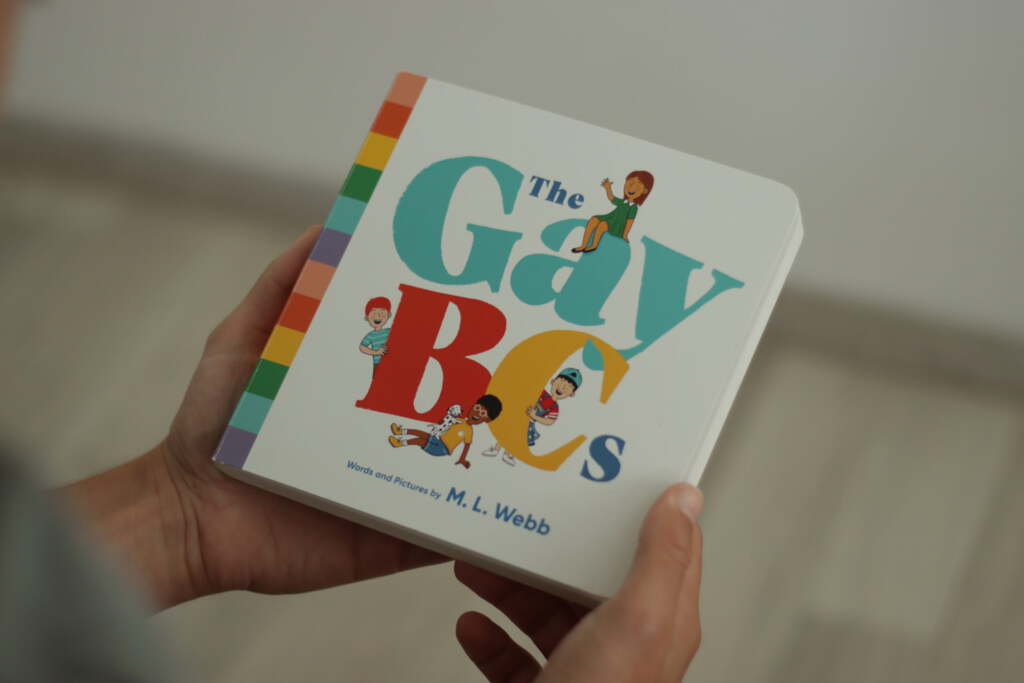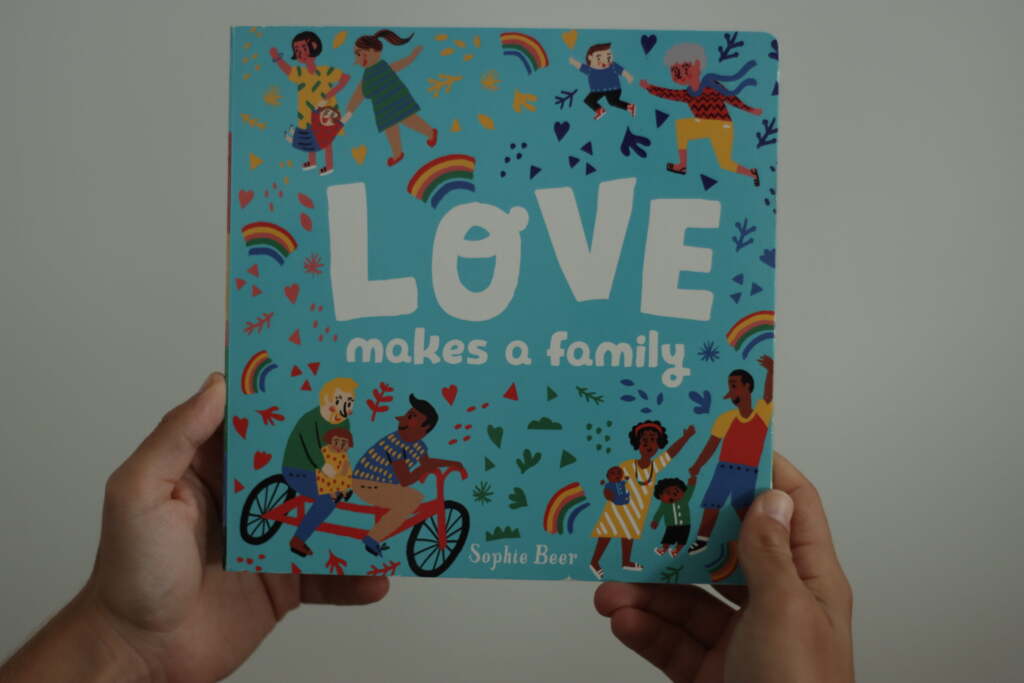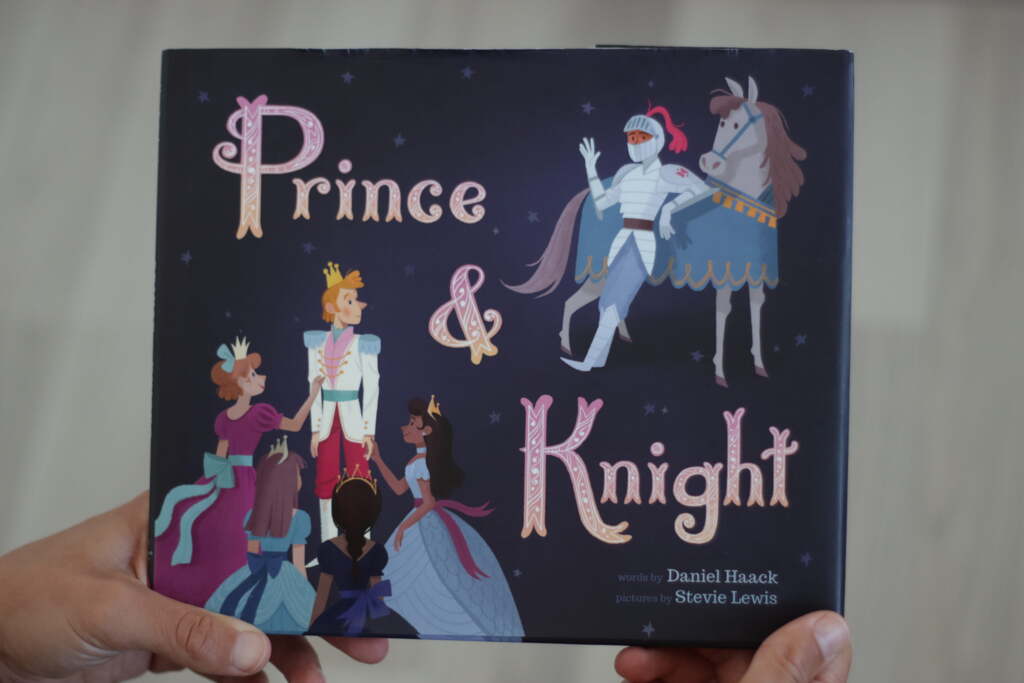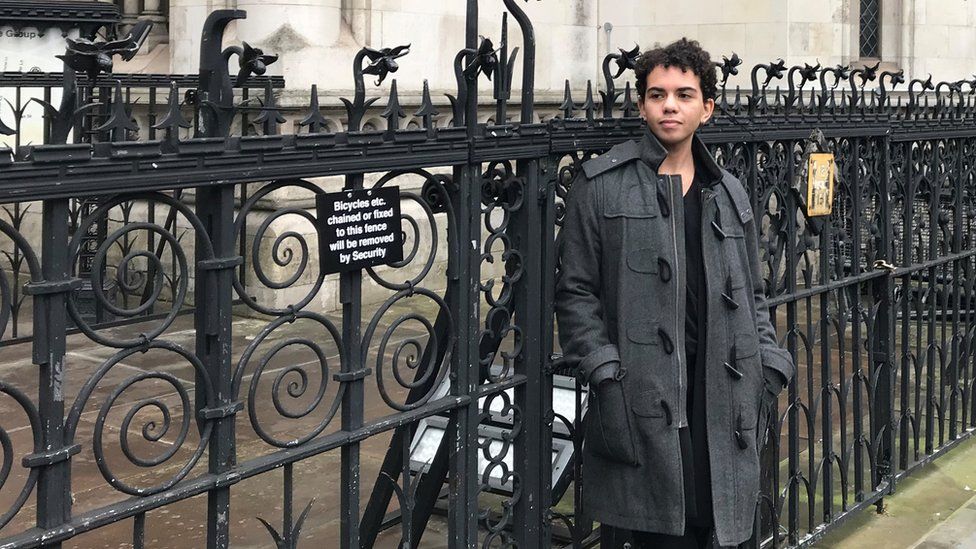By: V4 Agency
Storybooks, TV shows, camps, school activities – children are being targeted by the LGBTQ lobby on an increasing number of fronts, as gender ideology continues to seep into their lives from kindergarten onwards, often without their parents’ knowledge. In 2021, the ideological influence on children was stronger than ever.
Pride month on children’s TV channels
This June, to mark Pride month, the most popular children’s TV channels threw their weight behind the LGBTQ propaganda to an unprecedented extent, by starting to sensitise children through various programs.
The two biggest children’s channels made sensitising videos for kids featuring the Black Lives Matter movement and a transvestite performer, drag queen Nina West.
In Nickelodeon‘s sing-along Pride Song video, the drag queen explains the colours of the pride flag.
Producers of the children’s show Blue Clues also teamed up with Nina West to make a video in which non-binary characters sing together with the drag queen about gay pride at a Pride parade.
In the video they also sing about different types of family arrangements, including transgender, gay, and “non-binary” parents and children. The video had nearly 164,000 views in its first three days on Youtube, however, comments were disabled.
Nickelodeon had already released films ahead of Pride month in order to sensitise children, but in those the message was not pushed as blatantly but instead, was inserted as “educational material” in a cartoon.
In one clip, for example, while the letters of the ABC are enumerated, the letter P (for pride) appears on the screen several times in the colours of the “extended” rainbow including the blue, pink, and white of transgenderism.
Apart from Nickelodeon, Cartoon Network is also advocating the sensitising of children with an Instagram post wishing happy Pride month to all LGBTQ+ families. They also created a video featuring San Diego Pride Ambassador Jax, talking a bit about being different and his personal experiences.
Disney did not miss out on sensitising either. For 27 June, they produced an online show in honour of Pride month, once again hosted by drag queen Nina West, but with a guest appearance by Kermit the Frog from Sesame Street to promote the LGBTQ community.
With the event, Disney also sought to raise awareness regarding an NGO that aims to enable LGBTQ students to learn and grow in a school environment free from bullying and harassment. Alongside YouTube and Facebook, Disney+ was also broadcasting the show “This is Me: Pride Celebration Spectacular” to celebrate its LGBTQ+ creators, employees and fans. As part of the show, a concert featured musical performances of songs from iconic movies and series, reinterpreted through an LGBTQ+ lens.
LGBTQ propaganda disguised as preschool storybooks
As V4NA reported this year, a number of publications for children were published recently which teach the youngest ones about gender ideology.
One of these, The GayBCs was published in board book edition, clearly aimed at targeting the youngest children merely a few years old. Each page of the book presents a letter of the alphabet using words associated with gender ideology.

Most of the LGBTQ terms used describe some type of sexual orientation, so for example, the letter “A” is denoted by the word “asexuality”, with the letter “B” teaching preschoolers the concept of “bisexuality.” The letter “D” is for “drag” in the book, where the accompanying illustration depicts a cheerful little girl with a moustache who happens to be wearing men’s clothing. Wearing the clothes of the opposite sex is openly promoted throughout the book. To demonstrate the letter “S” for “sashay”, for example, two boys are shown dancing confidently in skirts.
The book openly targets preschool children with the aim of infusing the foundations of gender ideology into them at an early age.
The gender propaganda book seems to have had an impact. In a video shared on social media, a young boy is seen reciting the GayBCs.
As the video provoked general outcry, its original version was removed from Twitter. Some comments simply said it’s “brainwashing” that a young child can recite the “GayBCs” almost by heart, knowing exactly that the letter L stands for lesbians, that B denotes bisexuals, while C is for coming out.
Another similar book has also been published, without a protagonist or storyline, containing only pure LGBTQ propaganda. The authors make no attempt to conceal or disguise that their sole goal is to sensitise children with a focus on rainbow families, rather than the traditional family model.
The propaganda publication in the format of a storybook – “Love Makes a Family” – is illustrated with drawings of rainbow families to show what the authors believe it means to love and accept each other. The book’s front cover features a gay and a lesbian couple playing with their kids, as well as a wide range of rainbow families on the later pages, all intended for young ones.

But that’s all this collection of drawn propaganda posters, published in a book format for children, is about.
It does not teach kids the numbers or the colours, and there is no story, not even a protagonist. The publication is purely a collection of drawn LGBTQ propaganda, with the sole purpose of making children unsure at a very young age, from kindergarten.
Interestingly, the board book portrays a family with a father, a mother and children only once. It’s a Muslim family strolling in the zoo. Apparently, although the authors deemed it important to enhance the book’s diversity by featuring a Muslim family, they shied away from depicting them as a non-traditional family.
Pink For Boys is a similar resource book designed to sensitise preschool children by attempting to dismantle stereotypes associated with colours, while teaching them about colours based on the Pride flag. The authors consciously exploit the scientific fact that learning the basic colours is paramount to children’s development.

In addition to educational books, gender propaganda activists are also trying to get the message across through the rather uninventive rewriting of classic tales.
A good number of stories have been reworked. This is how the book called Prince & Knight was created. The original storyline – a prince rescues a helpless princess – was only altered by replacing the female character with a male one. The other elements of the tale are left intact, that is, once the gay couple gets married, they rule the kingdom together and live happily ever after.
Uncontrolled gender ideology is inundating schools, without parental consent
The publications disguised as storybooks are freely available for children, for example in the US, where under the keywords “diversity”, “non-violence”, and “integration”, publications promoting various doctrines of gender ideology are widely available on the shelves of school libraries.
The appearance of LGBTQ-themed storybooks does not help, but rather serves as a setback for children, a researcher at the conservative think tank The Heritage Foundation warns. According to Jared Eckert, research shows that early exposure to sexual content is linked to poor mental health, so he has warned parents to stay informed about the curriculum and what their children are taught in school.
It sparked a huge outrage when a copy of the book “Gender Queer: A Memoir” appeared in a school library in Virginia, because the former award-winning book – as evidenced by the photos – was found to contain child pornography and sexual intercourse besides sensitising content.
Later, it also turned out that the book is available in school libraries across the country, and this is how a mother in Rhode Island has also managed to obtain a copy. Outraged b ythe content, she posted many of the objectionable pictures from the book, as well as a correspondence in which the school administration defended the book and its content and refused to remove it from the school library’s shelves.
The sexual nature of the pictures featured in the book is equally reflected by the fact that Instagram and Facebook algorithms had removed the images shortly after publication citing violation of their social media guidelines, and the portrayal of sexual content and nudity.
The author, who identifies as queer, was given the opportunity to defend the book in the online edition of Washington Post. In an opinion piece, Kobabe wrote “queer kids need queer stories,” pointing out how embarrassing it was to listen to parents slandering the book at school meetings and seeing the criticisms on the internet.
In defence of the book, Kobabe wrote that “One of the charges thrown against the book was that it promoted pedophilia — based on a single panel depicting an erotic ancient Greek vase. Others simply called it pornography, a common accusation against works with themes of queer sexuality.”
The parents, however, were presumably not so much upset by the sight of an ancient Greek vase, but by images depicting oral sex, which fully qualify as pornography.
A good example of ideological education in schools is elementary school students in West Hartford, Connecticut being forced to learn about gender ideology, transgenderism, gender identity and “social justice standards”, all without their parents’ knowledge or approval.
After the curriculum and some adfitional information pertaining to the sensitising classes taught in the elementary schools in Connecticut has surfaced, the parents of students in the district contacted the non-profit Parents Defending Education organisation to express their concerns regarding the materials being used to teach young children these topics. PDE has been vocal against social justice and critical race theory teachings in schools, and helps parents who want to stand up against ideological sensitising of their children.
One parent expressed concern about their fourth-grader child being forced to read a book about a transgender boy.
In the book “When Aidan Became a Brother”, Aidan, the protagonist, was thought by everyone to be a girl. His parents gave him a pretty name, his room looked like a girl’s room, and he wore clothes that other girls liked wearing. After he realised that he was a trans boy, Aidan and his parents fixed the parts of his life that didn’t fit anymore, and he settled happily into his new life.
“I am troubled by When Aidan Became a Brother (4th grade) which is full on gender theory, that the sex you’re assigned at birth is ‘wrong’ and you’re actually a boy. This is being presented as factual to very young children,” one parent said.
The curriculum containing the book outlines reading materials for kindergarten through fifth grade that fit into four social justice standards: Identity, Diversity, Justice, and Action.
Trans camp for children and Pride parade for preschoolers
Making a rainbow flag and the kids’ own Pride graffiti, or taking part in a joint march. The activities were listed in the program sheet of a Pride event for preschoolers in Karlstad, Sweden, the local council reported on social media.
According to the post, the kindergartens involved in the events make strenuous efforts so that everyone can become who they would like to be, which was also the key message of the programme.
The photos show kids waving rainbow flags, teachers wearing fancy costumes or rainbow accessories, as well as children spray-painting a Pride graffiti that also features the blue-pink-white transgender flag.
The event has come under heavy criticism.
Many argue that children should not learn about all sorts of ideologies, they should just be allowed to remain children. Others point out that it is completely unnatural to teach children about transgender ideology and explain to preschoolers how they can change their gender. Still others say that the question whether they are attracted to girls or boys should not even occur to young children.
City Hall responded to the criticism by saying that the parents had been informed about the programme in advance and that participation was not mandatory.
As V4NA reported earlier, the library in Simrishamn, a small town in Sweden, hosted its own Pride Week targeting children. The library announced on social media that although they always showed support for LGBTQ issues and inclusion, they were planning to offer something special for this year’s Pride.
The photos shared in the post show how the library is being decorated with rainbow colours, as well as the vast number of LGBTQ-themed books for children and young ones they have collected.
During the library’s Pride Week, kids and teens had a chance to immerse themselves into various artisan courses and presentations, lectures.
Besides reading the publications, older children can also attend any of the camps that aim to introduce them to various LGBTQ branches and gender ideology.
In Scotland, for example, a drag-themed summer camp was organised for 11 to 18-year-olds about how to create a persona, apply makeup and the history of drag. In addition, during the courses the participants can also explore themselves, the organisers say.
“You can use drag to explore anything you want to,” this is how Natalie Doidge, the organiser of Scotland’s first summer “drag school” for teenagers, promoted her event, which opened its doors in July after facing down controversy.
A significant number of online commenters have expressed concern about the camp, saying it puts a great emphasis on sexuality. Some accused the organisers of exploiting children and lying to them in order to “groom” younger people.
King Dalby, the other organiser of the event adds: “A lot of the complaints were from people who didn’t really understand what drag is. People have this idea that drag is offensive, but it’s not – you can make fun of the ridiculous stereotypes.”
Trans ideology has become so powerful among young people that there are some who do not only wish to change their gender, but have also stopped identifying as a human being. This was the final conclusion of an ultra-woke TikToker, who stated that she did not identify as a human being.
The recent video posted by the TikToker starts with a short, nearly commonplace declaration of her preferred pronouns. The individual, who biologically resembles a girl but does not identify as such, says she is fine with any and all pronouns others use with her, but prefers to be referred to by the endearment term “prince” and finds gender neutral language to be the most fitting and acceptable.
She then proceeds to explain her shift in attitude, attributing the first phase to presenting and being perceived as a woman all her life, but eventually realising that gender was not a significant part of her identity. She finally concludes that this was because
she is unable to define herself as a human being.
Some young people, however, decided to hack the education system by questioning whether they belong to the human race.
In a Kentucky school district known to be a fortress of liberal education, students decided to identify as cats, stop following the lessons and purr beside the windows instead.
Puberty blockers for minors
It attracted a lot of attention and sparked a huge outrage this year when minors were repeatedly granted access to puberty blockers.
A
The British Court of Appeal has ruled that under-aged citizens can again have access to hormones needed for gender reassignment, despite a number of scandals that have erupted in recent years over how easily these substances were available to young people.
Even though embarking on a gender change is a decision many young people tend to regret later, puberty blockers and hormone treatments cause irreversible bodily changes.
The UK Court of Appeal has ruled that doctors can judge whether their patients under the age of 16 require puberty-blockers, enabling minors to regain access to these preparations.
The current decision reverses a 2020 ruling that under-16s lacked capacity to give informed consent to the treatment, which delays the onset of puberty. Puberty blockers are drugs that are used to delay puberty until the person being treated decides what their gender identity is. This type of preparation is most often prescribed to children with gender dysphoria.
The previous decision came after a young woman, Keira Bell, sued one of England’s best-known gender identity clinics, the Tavistock and Portman NHS Trust clinic, for allegedly irresponsibly giving her puberty blockers when she was just 16 and not warning her of the consequences.

Keira Bell
The recent decision by the Court of Appeal was welcomed by Tavistock Clinic, who said “the judgment reaffirmed previously established legal principles that respect the ability of clinicians to participate thoughtfully in decisions about patient care and their future.
From now on, doctors, not judges, will be able to decide whether under-16s can access puberty-blocking medical treatment, giving young people time to consider their options and continue to explore their gender identities before making a decision,” the spokesman for the clinic said.
The ruling also means that doctors working with families, and the children themselves, will be able to decide if the person being treated is really aware of the consequences of the medication that is bound to change their lives in an irreversible way. The court will only have authority in case the parties fail to agree on the treatment.
Many, however, including Keira Bell, disagree with the court’s ruling.
Keira, who was prescribed male hormones in addition to puberty blockers and also underwent a breast surgery to be able to live as a man, reiterated several times that she thinks there was not enough inspection or therapy before her treatment was started.
Keira hopes her case can “shine some light into the dark corners of a medical scandal.”
“I am obviously disappointed with the ruling of the court today, and especially that it did not grapple with the significant risk of harm that children are exposed to by being given powerful experimental drugs.”
Ms Bell’s problem is not a standalone issue. The UK-based gender assignment clinic has been embroiled in several scandals for giving young children hormone treatments too easily. This, as Keira’s case shows, is dangerous, because the kids – due to their young age – do not have capacity to understand the consequences and many of them regret transitioning. However, by the time they realise this, it may be too late as the consequences are already irreversibly present in their lives, as in Keira’s case.
Detransition Advocacy Network was set up in November to bring together such young people, to support those who want to return to their original gender (detransition), or who simply wish to stop their transitioning process. The organisation provides information on the effects of stopping hormone therapy and brings in experts to give advice.
Detransition Advocacy Network founder Charlie Evans has also undergone gender reassignment before accepting her original, biological sex. Evans was born a woman, but she lived as a man for ten years before accepting being female, making her particularly empathetic to those who want to detransition. She says she has spoken with many young people who regret transitioning and do not feel better for it. Most of them are young lesbian women who are not even aware of their options, she added.

